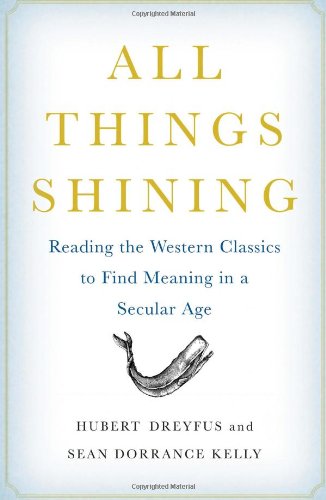
In the current issue of the New York Review of Books, Garry Wills reviews All Things Shining: Reading the Western Classics to Find Meaning in a Secular Age by Hubert Dreyfus and Sean Dorrance Kelly, who, according to Wills, recycle once again the notion that the Middle Ages presented a uniquely unified culture free of the taint of modernism and post-modernism.
by Hubert Dreyfus and Sean Dorrance Kelly, who, according to Wills, recycle once again the notion that the Middle Ages presented a uniquely unified culture free of the taint of modernism and post-modernism.
Here is the first paragraph of Wills’s review:
This book, which was featured on the front page of The New York Times Book Review, comes recommended by some famous Big Thinkers. It is written by well-regarded professors (one of them the chairman of the Harvard philosophy department). This made me rub my eyes with astonishment as I read the book itself, so inept and shallow is it. The authors set about to solve the problems of a modern secular culture. The greatest problem, as they see it, is a certain anxiety of choosing. In the Middle Ages, everyone shared the same frame of values. One could offend against that frame by sinning, but the sins were clear, their place in the overall scheme of things ratified by consensus. Now that we do not share such a frame of reference, each person must forge his or her own view of the universe in order to make choices that accord with it. But few people have the will or ability to think the universe through from scratch.
Everything old is new again. Frye called this the “butterslide” theory of history, sometimes rendered as “the Great Western Butterslide,” whose roots lay in an idealized conception of the Middle Ages.
Here he is in a 1947 Canadian Forum review of F.S.C Northrop’s The Meeting of East and West:
Hence, for many American thinkers today the gigantic synthesis of religion, philosophy, science and politics achieved in the Middle Ages looms up in front of them like an intellectual Utopia which complements that of their own moral idealism. American magazines and books are thickly strewn with admiring references to Aristotle, St. Thomas, the seven liberal arts and the medieval preservation of personal values; and of deprecatory ones to the cult of self-analysis, the dehumanizing of the individual, and the centrifugal movements in politics and science which came with the Renaissance and sent us skittering down the butterslide of introversion into our present Iron Age. (CW 11, 198)
And here he is at the other end of his career in conversation with David Cayley, providing an alternative to the butterslide view:
Cayley: We stand at what sometimes seems to be the end of a tradition. . . . At one time Spengler was important to you. Later on you satirized him and made jokes about the Great Western Butterslide. Do you accept the idea of decline in Spengler, and do you wonder now what’s next?
Frye: I’m not sure I ever reacted to the word “decline” in Spengler’s work. The vision I got from Spengler was not a vision of decline. It was a vision of maturing to a certain point. The question of cycle always turns up. There is a cycle in Vico, it’s a little different in Spengler, but it’s a cycle again in Toynbee. As I’ve said often, every cycle is a failed spiral. When you get to the end of the cycle, what should be done is to encompass the entire structure up to that point on another level, not just to go back to the beginning, although there’s going to be a certain amount of that. (CW 24, 1034-5)




